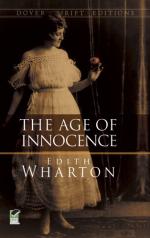The Vicar, after a glass of port, was obliged to hurry away to a meeting, and the shy nephew, who appeared to be an invalid, was packed off to bed. But Archer and the tutor continued to sit over their wine, and suddenly Archer found himself talking as he had not done since his last symposium with Ned Winsett. The Carfry nephew, it turned out, had been threatened with consumption, and had had to leave Harrow for Switzerland, where he had spent two years in the milder air of Lake Leman. Being a bookish youth, he had been entrusted to M. Riviere, who had brought him back to England, and was to remain with him till he went up to Oxford the following spring; and M. Riviere added with simplicity that he should then have to look out for another job.
It seemed impossible, Archer thought, that he should be long without one, so varied were his interests and so many his gifts. He was a man of about thirty, with a thin ugly face (May would certainly have called him common-looking) to which the play of his ideas gave an intense expressiveness; but there was nothing frivolous or cheap in his animation.
His father, who had died young, had filled a small diplomatic post, and it had been intended that the son should follow the same career; but an insatiable taste for letters had thrown the young man into journalism, then into authorship (apparently unsuccessful), and at length—after other experiments and vicissitudes which he spared his listener—into tutoring English youths in Switzerland. Before that, however, he had lived much in Paris, frequented the Goncourt grenier, been advised by Maupassant not to attempt to write (even that seemed to Archer a dazzling honour!), and had often talked with Merimee in his mother’s house. He had obviously always been desperately poor and anxious (having a mother and an unmarried sister to provide for), and it was apparent that his literary ambitions had failed. His situation, in fact, seemed, materially speaking, no more brilliant than Ned Winsett’s; but he had lived in a world in which, as he said, no one who loved ideas need hunger mentally. As it was precisely of that love that poor Winsett was starving to death, Archer looked with a sort of vicarious envy at this eager impecunious young man who had fared so richly in his poverty.
“You see, Monsieur, it’s worth everything, isn’t it, to keep one’s intellectual liberty, not to enslave one’s powers of appreciation, one’s critical independence? It was because of that that I abandoned journalism, and took to so much duller work: tutoring and private secretaryship. There is a good deal of drudgery, of course; but one preserves one’s moral freedom, what we call in French one’s quant a soi. And when one hears good talk one can join in it without compromising any opinions but one’s own; or one can listen, and answer it inwardly. Ah, good conversation—there’s nothing like it, is there? The air of ideas is the only air worth breathing. And so I have




